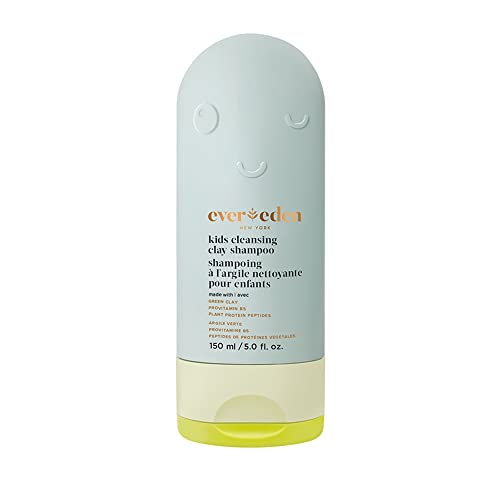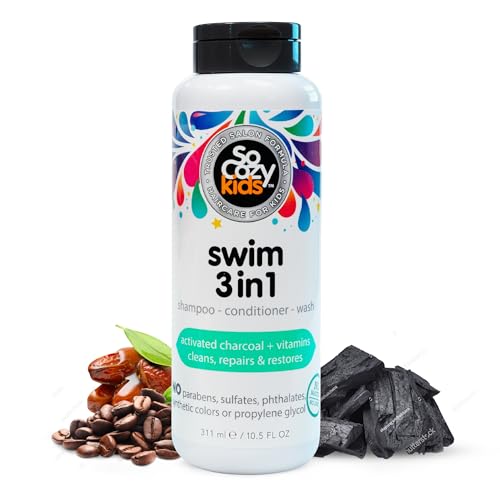After a fun-filled day splashing in the pool or playing by the ocean, the last thing you want is dry, brittle hair or a dreaded greenish tint. Chlorine, salt, and other chemicals in water can wreak havoc on delicate kids’ hair and sensitive scalps. That’s where a fantastic after swim shampoo for kids comes in!
These specially formulated shampoos are designed to gently remove chlorine buildup, minerals, and other residues without stripping natural oils, leaving your child’s hair soft, shiny, and healthy. We’ve rounded up the 7 top contenders that parents swear by to make post-swim hair care a breeze. Let’s dive in!
Why Your Child Needs a Dedicated After Swim Shampoo
You might be wondering if a regular shampoo is enough, but trust us, it’s not. Chlorine, while great for keeping pool water clean, isn’t so great for hair. It can dry out strands, cause tangles, and even lead to that dreaded green discoloration, especially in lighter hair. Saltwater also dehydrates hair.
A good chlorine removal shampoo for kids tackles these issues head-on. It helps neutralize chemicals, restore moisture, and prevent damage, ensuring your little swimmer’s locks stay luscious all swim season long. These specialized formulas are often gentler, too, perfect for delicate hair and scalps.
Our Top Picks for the Best After Swim Shampoo for Kids
Here are our top selections, chosen for their effectiveness, gentle formulas, and rave reviews from parents!
1. SoCozy Kids Swim 3-in-1 Shampoo, Conditioner & Body Wash

This 3-in-1 wonder from SoCozy is a true game-changer for busy parents and active kids. It’s designed to be a one-stop solution, gently cleansing hair and body while specifically targeting chlorine and those unsightly green tones. Infused with nourishing ingredients like Activated Charcoal and Jojoba Oil, it works to restore hydration and leave hair feeling soft and silky, making post-swim showers quick and effective.
- Key Features:
- Cleans Hair & Repairs: Gently removes green tones and chlorine without stripping essential oils.
- Ultra Moisturizing Ingredients: Formulated with Activated Charcoal, Jojoba Oil & Coffee Seed Extract.
- Salon Quality Formula: Developed with over 20 years of kids’ hair care expertise.
- No Nasty Ingredients: Free of Parabens, Sulfates, Phthalates, Formaldehyde, Synthetic Colors/Dyes & Propylene Glycol.
- Convenient & Travel Friendly: All-in-one formula perfect for on-the-go.
- Pros:
- All-in-one product saves time and space.
- Effectively removes chlorine and green tint.
- Hydrates and softens hair.
- Free from harsh chemicals, gentle on skin and scalp.
- Great for travel and busy families.
- Cons:
- Some children might prefer a separate conditioner for very dry or tangled hair.
- Scent is not explicitly mentioned, which might be a factor for some.
- User Impressions: Parents frequently praise the incredible convenience of this 3-in-1 formula, highlighting how well it cleans without drying out their kids’ hair. Many also appreciate the peace of mind knowing it’s free from undesirable chemicals, making bath time a breeze.
- See it on Amazon here
2. Evereden After Swim & Sports Kids Shampoo

Evereden’s After Swim & Sports Kids Shampoo is a premium choice for parents seeking a deep yet gentle cleanse for their active little ones. Formulated with Green Kaolin Clay, this shampoo works to detox hair from chlorine, sweat, and dirt, all while maintaining essential moisture. It’s a fantastic option for bringing the scalp back into balance and strengthening hair after vigorous water activities, making it suitable for the whole family.
- Key Features:
- Deep & Gentle Cleansing: Uses Green Kaolin Clay to detox from chlorine, sweat, & dirt without stripping moisture.
- Balanced Scalp: Kaolin Clay and Provitamin B5 help reduce excess oil and protect moisture.
- Strength and Hair Repair: Fights frizz, adds shine, strengthens, and moisturizes with Plant Protein Peptides and Argan Oil.
- For Daily Use by the Whole Family: Made for children 3+, but great for everyone.
- Made in USA: Pediatrician & dermatologist-tested, hypoallergenic & free of toxins.
- Pros:
- Effectively detoxifies hair from chemicals and impurities.
- Helps maintain a healthy, balanced scalp.
- Strengthens and adds shine to hair.
- Gentle enough for daily use and suitable for the entire family.
- Hypoallergenic and free from toxins.
- Cons:
- Premium price point compared to some other options.
- The clay formula might feel different than traditional shampoos.
- User Impressions: Customers rave about this shampoo’s ability to leave hair feeling incredibly clean, soft, and shiny, even after heavy swimming. Many appreciate its natural, gentle formulation and the fact that it’s suitable for all ages, often becoming a family favorite.
- See it on Amazon here
3. After Swim Shampoo for Kids & Adults – Clarifying Shampoo

This clarifying shampoo from Maple Holistics is a robust solution designed for both kids and adults who spend a lot of time in the water. Packed with ultra-clarifying and rehydrating essential oils, including power-player Tea Tree Oil, it offers a deep cleanse that thoroughly removes chlorine buildup and other residues. It’s not just a post-swim treatment; its multipurpose formula also offers pre-swim protection, making it a comprehensive choice for water lovers.
- Key Features:
- After Swim Hair Care: Made with ultra-clarifying and rehydrating essential oils.
- Bye Bye Build Up: Thoroughly removes chlorine and offers gentle beach & pool hair protection.
- Featuring Tea Tree Oil: Known for deep cleansing, clarifying, and conditioning properties.
- Multipurpose Formula: Works as swim shampoo, chlorine removal, and pre-swim protection.
- Maple Holistics Quality: Uses real ingredients for real results.
- Pros:
- Powerful clarifying action for tough chlorine and mineral buildup.
- Tea Tree Oil provides scalp benefits and a fresh feel.
- Offers both post-swim cleansing and pre-swim protection.
- Suitable for both children and adults.
- Rehydrates with essential oils.
- Cons:
- The strong clarifying action might require a good conditioner afterward for very dry hair types.
- Tea Tree Oil scent might be too strong for some sensitive noses.
- User Impressions: Users consistently praise how effective this shampoo is at removing chlorine and leaving hair feeling truly clean and refreshed. Many appreciate the natural ingredients and the added benefit of pre-swim protection, making it a staple for regular swimmers.
- See it on Amazon here
4. Fairy Tales Swim Shampoo 12oz and Conditioner 8oz for Swimmers

Fairy Tales, a trusted name in kids’ hair care, offers this fantastic Sun & Swim combo specifically formulated for active summertime hair. This duo works together to hydrate, condition, and detangle hair that’s been exposed to sun, chlorine, and sea salt. The shampoo gently clarifies with natural ingredients like grapefruit and pineapple extracts, while the conditioner replenishes moisture, combating dryness and preventing that dreaded green tint. It’s even color-safe for mom!
- Key Features:
- Sun, Beach, and Pool Essential: Specifically formulated for kids’ summertime hair care.
- Damaged Hair? Removes Green from chlorine hair, sea salts, and minerals.
- Natural Ingredients: Grapefruit peel oil, orange flower extract, pineapple fruit extract gently clarify.
- Replenish Moisture: Paired with Lemon-Aid Conditioner (aloe, wild cherry bark, jojoba, vitamin B).
- No Yucky stuff: Sulfate free, paraben free, phthalate free, gluten free, soy free, dairy free, nut-free.
- Pros:
- Comprehensive two-step system for cleaning and conditioning.
- Effectively removes chlorine, green tint, and mineral buildup.
- Natural ingredients are gentle and clarifying.
- Hydrates and detangles dry, brittle hair.
- Free from common allergens and harsh chemicals, plus color-safe.
- Cons:
- Higher price point since it’s a shampoo and conditioner combo.
- Might require consistent use for best results on severely damaged hair.
- User Impressions: This combo is a fan favorite, especially for families dealing with green hair from chlorine. Parents love how soft and manageable it leaves their children’s hair, and many appreciate the natural, allergen-friendly formula. The conditioner gets special shout-outs for its detangling power.
- See it on Amazon here
5. Fairy Tales Swim Shampoo for Kids – 12 oz

As a standalone product, the Fairy Tales Swim Shampoo for Kids delivers excellent chlorine and mineral removal without the harshness. Building on the brand’s reputation for gentle yet effective formulas, this shampoo is your go-to for clarifying hair exposed to pool chemicals or ocean salt. It uses natural fruit extracts to gently strip away build-up and prevent green hair, preparing the hair for subsequent conditioning. While this specific listing is for the shampoo only, it shares the same beloved qualities as the shampoo from the combo pack.
- Key Features:
- Sun, Beach, and Pool Essential: Specially formulated for kids’ summertime hair care.
- Removes Green: Effectively tackles chlorine, sea salts, and minerals that damage hair.
- Natural Ingredients: Grapefruit peel oil, orange flower extract, and pineapple fruit extract gently clarify.
- Chelating Shampoo: Gentle yet effective, also color safe for adults.
- No Yucky stuff: Sulfate free, paraben free, phthalate free, gluten free, soy free, dairy free, nut-free.
- Pros:
- Highly effective at removing chlorine and preventing green hair.
- Natural ingredients provide gentle clarification.
- Safe for sensitive scalps and free from many common allergens.
- Color-safe, making it versatile for the whole family.
- Cons:
- This specific listing does not include conditioner, which is often needed after clarifying.
- May require a separate purchase of conditioner for optimal results on dry hair.
- User Impressions: Many parents vouch for this shampoo’s ability to clean thoroughly without causing irritation. It’s especially popular for preventing and reversing green hair, and the natural scent is often a hit. Users frequently recommend pairing it with the matching conditioner for the best results.
- See it on Amazon here
6. TRISWIM Kids Chlorine Removal Shampoo 8.5oz

TRISWIM Kids Chlorine Removal Shampoo is specifically engineered for serious little swimmers. This powerful formula goes beyond just cleansing; it actively works to wash away chlorine, bromine, salt water, and hard water minerals. But it doesn’t stop there – infused with Chamomile and Watercress, it also soothes dry, itchy scalps, a common issue after frequent swimming. The delightful Lime + Tropical Mango scent makes post-swim hair care enjoyable for kids, making it a top contender for the best after swim shampoo for kids who spend hours in the water.
- Key Features:
- Gently Removes Chlorine & Chemical Buildup: Targets chlorine, bromine, salt, and hard water minerals, eliminating odors and green tint.
- Soothes Dry, Itchy Scalp: Infused with Chamomile and Watercress to relieve dandruff, dryness, and irritation.
- Nourishes & Strengthens Hair: Enriched with Aloe Vera, Vitamin A, and Pro Vitamin B5 to hydrate, boost shine, and support healthy hair.
- Kid-Friendly Scent: Light Lime + Tropical Mango scent makes it refreshing and fun.
- Safe for daily use after any water activity.
- Pros:
- Highly effective at neutralizing all types of water chemicals.
- Actively soothes and comforts the scalp.
- Nourishes and strengthens hair with vitamins and aloe.
- Appealing scent that kids love.
- Gentle enough for everyday use.
- Cons:
- A separate conditioner is recommended for maximum moisture, especially for very tangled hair.
- While effective, might require more frequent application for very heavy swimmers.
- User Impressions: TRISWIM is often the go-to for competitive young swimmers. Parents praise its superior ability to completely remove chlorine smell and prevent green hair. The soothing effect on the scalp and the pleasant, kid-approved scent are also frequently highlighted as major positives.
- See it on Amazon here
7. Babo Botanicals Swim & Sport Citrus Mint & Passion Fruit Shampoo & Body Wash

Babo Botanicals offers a fantastic 2-in-1 solution with their Swim & Sport Shampoo & Body Wash, perfect for babies, kids, and even adults with sensitive skin. This improved formula purifies, hydrates, and replenishes hair, scalp, and skin after pool or beach activities. It’s packed with plant-based ingredients like organic Aloe Vera, Green Tea, and Phytic Acid from passion fruit seeds to gently remove chlorine, minerals, and salt. Hypoallergenic and clinically tested, it’s a truly gentle and effective choice for the whole family.
- Key Features:
- New Improved Formula: Purifies, hydrates, and replenishes hair, scalp, and skin.
- Formulated to Clarify: Specifically developed with organic Aloe Vera and Green Tea.
- Plant-based & Hypoallergenic: Phytic acid from passion fruit seeds helps remove chlorine, minerals, and salt.
- No Harsh Chemicals or Irritants: Hypoallergenic, clinically tested, gluten, soy, dairy, peanut, almond, and walnut free. Vegan friendly.
- Gentle Enough for Daily Use: Rinses away easily and suitable for all ages.
- Pros:
- 2-in-1 formula is convenient for busy families.
- Hypoallergenic and free from numerous common allergens, ideal for sensitive skin.
- Uses organic and plant-based ingredients for natural purification.
- Gentle enough for babies and daily use.
- Effectively removes chlorine, salt, and minerals.
- Cons:
- The “Citrus Mint” scent might not appeal to every child.
- As a 2-in-1, it may not provide enough conditioning for very dry or thick hair without a follow-up conditioner.
- User Impressions: This product is highly regarded by parents seeking a very gentle, natural, and hypoallergenic option. Customers love that it cleanses effectively without causing dryness or irritation, and many appreciate the light, refreshing scent. Its suitability for all ages, including babies, is a huge plus.
- See it on Amazon here
Conclusion
Choosing the right after swim shampoo for kids is an essential part of any swim-time routine. Whether you’re looking for a convenient 3-in-1, a powerful chlorine remover, or a super-gentle, plant-based option, there’s a perfect product out there to keep your child’s hair healthy, happy, and vibrant. Say goodbye to green hair and dry ends, and hello to endless summer fun!
FAQ: Your Top Questions About Kids’ After Swim Shampoos
Q1: Why is a special after swim shampoo important for kids?
A1: Regular shampoos aren’t designed to effectively remove chlorine, salt, and other pool/ocean chemicals. These chemicals can dry out hair, cause tangles, and lead to discoloration (like green hair). After swim shampoos are formulated with specific ingredients to neutralize and wash away these residues while restoring moisture.
Q2: How often should my child use an after swim shampoo?
A2: It’s best to use an after swim shampoo immediately after every swim session, especially if your child swims frequently. If they swim occasionally, a regular gentle shampoo might suffice, but for consistent pool or beach time, a dedicated swim shampoo is highly recommended.
Q3: Can after swim shampoo prevent green hair from chlorine?
A3: Yes! Many after swim shampoos are specifically formulated to help prevent and remove the greenish tint caused by copper oxidizing on hair strands due to chlorine exposure. They work by chelating (binding to) and rinsing away these mineral deposits.
Q4: Are these shampoos safe for sensitive scalps or skin?
A4: Most kids’ after swim shampoos are formulated to be gentle and many are free of harsh chemicals like sulfates, parabens, and phthalates, making them suitable for sensitive skin and scalps. Always check the product’s ingredient list and look for terms like “hypoallergenic” or “pediatrician-tested” if your child has particular sensitivities.
Q5: What key ingredients should I look for in an after swim shampoo?
A5: Look for ingredients that help remove chemicals and hydrate hair. Common beneficial ingredients include chelating agents (like citric acid or EDTA derivatives), natural clarifiers (fruit extracts), moisturizing oils (jojoba, argan), vitamins (B5, A), aloe vera, and plant extracts (chamomile, green tea).
Q6: Do I still need to use a conditioner after an after swim shampoo?
A6: For many children, especially those with long, thick, or dry hair, following up with a good conditioner (or using a 2-in-1 product with strong conditioning properties) is highly recommended. Clarifying shampoos can sometimes leave hair feeling a bit dry, and a conditioner will help detangle, add moisture, and leave hair soft and manageable.
Q7: Can adults use kids’ after swim shampoos?
A7: Absolutely! Many kids’ after swim shampoos are gentle and effective enough for adults, especially those with sensitive skin or who prefer milder formulations. Some brands even market their swim care lines for the whole family.
Q8: What’s the best way to protect my child’s hair before swimming?
A8: Before swimming, wet your child’s hair with clean tap water and apply a leave-in conditioner or a small amount of regular conditioner. This creates a barrier that helps prevent the hair from absorbing too much chlorine or salt water, making the after-swim clean-up even easier.

